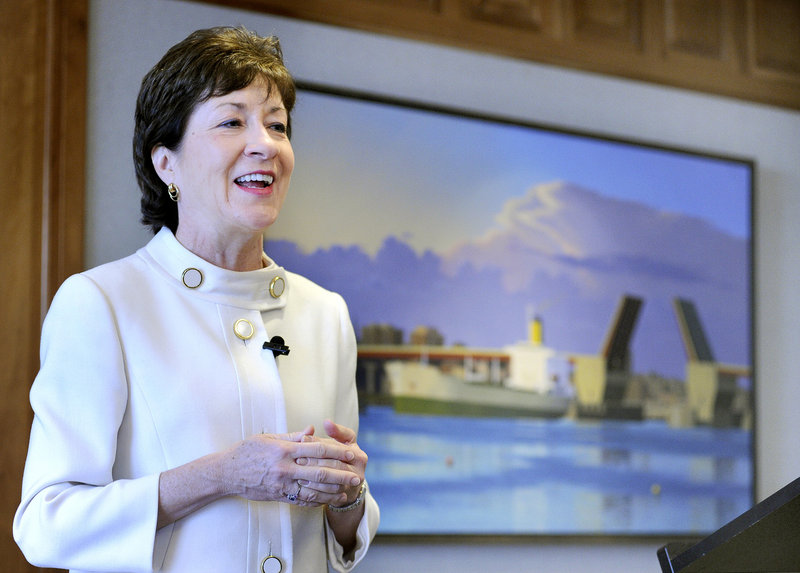Allowing gays and lesbians to serve openly in the military may have little to do with deficit reduction and fiscal responsibility, but for Shane Flynn they are related, at least in respect to the role of U.S. Sen. Susan Collins.
“If we don’t have courageous politicians willing to take on difficult matters and engage people in serious conversation, the country is set for serious setbacks in the future,” said Flynn, managing director of Cordjia, a financial services company based in Camden and Delaware.
Flynn was one of 70 members of the New England Council who gathered Friday to hear Collins, R-Maine, at a congressional roundtable breakfast held at the Preti Flaherty law firm in Portland.
Members praised her leadership in repealing the ban on openly gay members of the military, and suggested that such leadership and bipartisanship could help with other issues that face the country.
In her 30-minute address to the regional business group, Collins spoke about her role in lifting the ban — an effort that appeared all but dead at the end of the 2010 congressional session.
At one point, she was the only Republican member of the Senate Armed Services Committee to support repeal of the military’s “don’t ask, don’t tell” policy.
Collins described haggling with Senate Majority Leader Harry Reid of Nevada in the waning days of 2010, her work to persuade key Republican allies to support repeal, and the challenge of opposing a close friend, veteran GOP Sen. John McCain of Arizona.
“It was exciting to help lead what I believe to be a historic change for our country, but boy it was not easy to get there,” Collins said.
She also described how Reid almost scuttled the effort by suggesting she was inflexible, even as negotiations were close to succeeding, and by insisting on a vote without letting opponents of the ban — people like McCain — offer amendments.
Members in the business group praised her leadership on the issue and her ability to work with Republicans and Democrats.
Michael Dubyak, president and CEO of Wright Express, asked Collins her views on gerrymandering, the practice by which congressional districts are drawn to ensure that one party wins a seat.
Collins said the practice encourages politicians to appeal to the most partisan voters in their districts, rather than seeking support from moderates.
“The result is, elections get decided in primaries,” she said, and those primaries are often won by the more extreme candidates.
The result, she said, is a loss of civility, with Republicans claiming the federal health reform law includes death panels and Democrats claiming Republicans’ approach to health care is for people to die quickly.
She also said that the current effort in the U.S. House to repeal health care reform is symbolic, because it wouldn’t pass in the Senate and would be vetoed by President Barack Obama even if it did.
Responding to Flynn’s question about prospects for greater fiscal discipline in Washington, Collins said she has pushed for a cap on discretionary spending for three years, which would save $300 billion.
But she said the real reform must occur with entitlement programs like Medicare, Medicaid and Social Security. Nobody, she said, wants to be the first to propose painful changes.
“The president must lead,” she said. “It’s kind of like Nixon going to China. The president could make this his legacy.”
Staff Writer David Hench can be contacted at 791-6327 or at:
dhench@pressherald.com
Send questions/comments to the editors.



Success. Please wait for the page to reload. If the page does not reload within 5 seconds, please refresh the page.
Enter your email and password to access comments.
Hi, to comment on stories you must . This profile is in addition to your subscription and website login.
Already have a commenting profile? .
Invalid username/password.
Please check your email to confirm and complete your registration.
Only subscribers are eligible to post comments. Please subscribe or login first for digital access. Here’s why.
Use the form below to reset your password. When you've submitted your account email, we will send an email with a reset code.